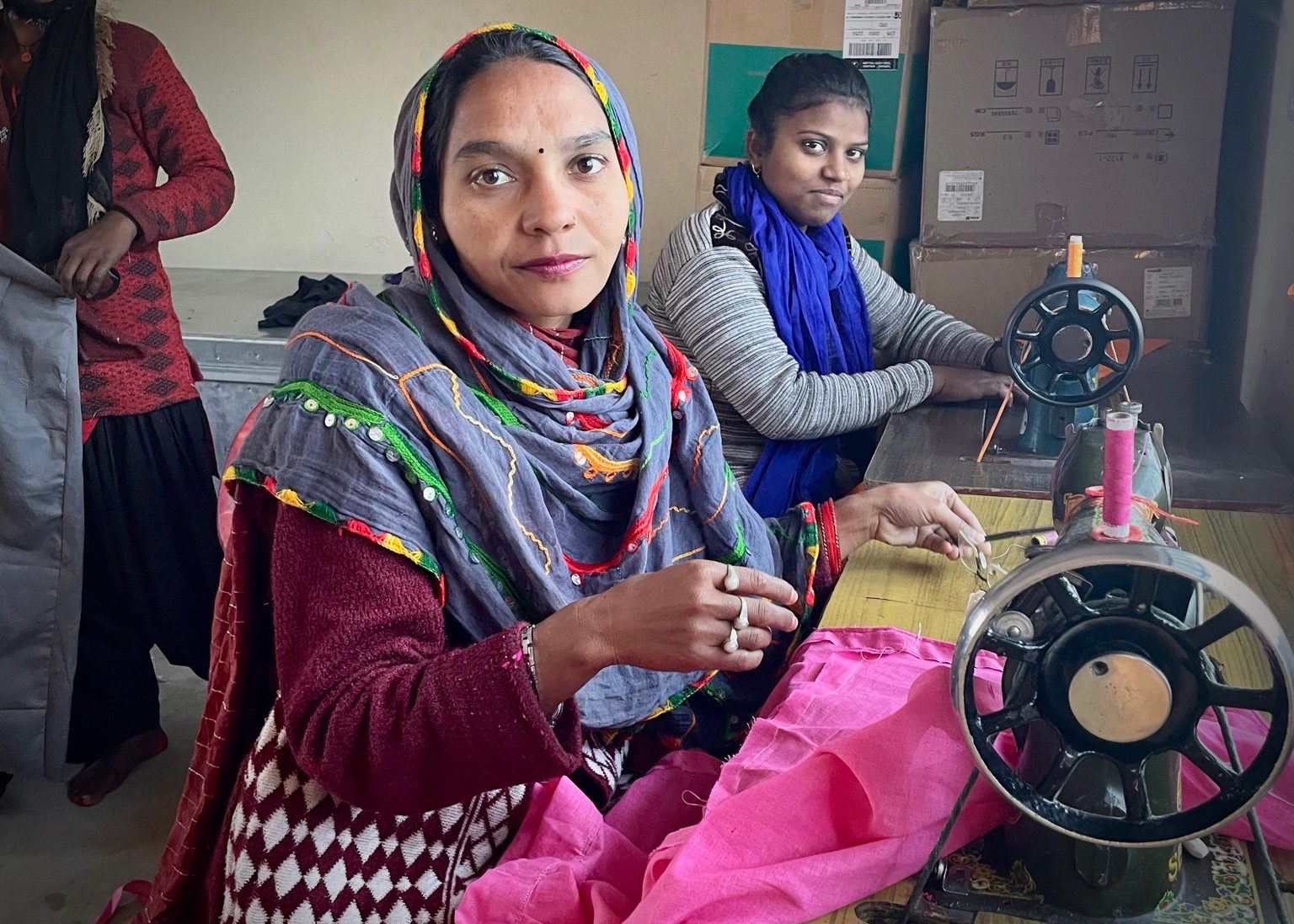
Ending Child Labor, Forced Marriage and Labor Exploitation: A Success Story from Rural India, Part 2
Photo: *Preethi avoided forced marriage and became a successful business woman due to support and training from Lok Samiti
This blog post is part 2 of a 2 part series by Rebekah Enoch, Program Director for Human Trafficking Search. The italicized introduction below is excerpted from the first blog post. Read part 1 here.
Varanasi is a very special spiritual place for those of the Hindu faith who believe that anyone who dies in Varanasi city will attain salvation and freedom from the cycle of birth, death, and rebirth. All hours of the night and day you can witness devotees by the river Ganges worshiping, holding sacred rituals and sending off loved ones who have passed away, all in the hopes of a better future. But about 30 minutes outside Varanasi city, is a village called Nagepur (Usrapatti) where an organization called Lok Samiti is focused on improving the living conditions for people in the here and now. On a recent trip to India I had the privilege of visiting Nagepur to sit down and talk with Nandlal Master who founded Lok Samiti. By providing localized tools and support to help end modern slavery in Nagepur and the surrounding area, Lok Samiti is part of a growing movement of community-based organizations across India helping rural impoverished communities learn how to advocate for themselves and usher in a better future in the present life.
During the 10th session of the United Nations Inter-Agency Network on Women and Gender Equality (IANWGE) an Inter-Agency Task Force on rural women was established to provide strategic direction and guidance to relevant UN processes and UN agencies working in rural areas. As part of their findings the task force stated “Rural women’s access to education and training can have a major impact on their potential to access and benefit from income-generating opportunities and improve their overall well-being.” In a recent project in Uttar Pradesh, where Lok Samiti is located, the UN held training classes on workers rights for women as well as informed them of an Indian Government program, MGNREGA, which guarantees at least 100 days of employment a year for every adult member of a rural household willing to do unskilled manual work for the minimum wage of 211 Indian rupees (USD 2.55) per day in Uttar Pradesh. The trained women were then employed on a local improvement project to test their new skills. The construction project which included planning and building a lake for local use, was successfully planned, run and completed entirely by women. The results of the UN training demonstrated to everyone involved the capacity and ability of women to contribute and make positive changes in their community. Further, the training helped the women, many of whom had been treated as “bonded laborers” in the past, assert and demand their right to employment and a proper wage, underlining just how powerful rights based education can be.
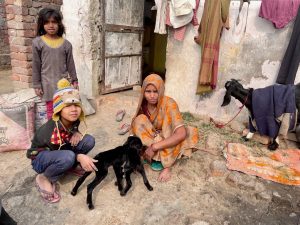
Starting in childhood women and girls bear the burden of taking care of younger siblings, cooking, domestic chores, and looking after the livestock. Very few have ownership over land or productive assets, however a majority of the agricultural laborers in India are women.- CEDAW/OHCHR photo: Rebekah Enoch
When the MGNREGA legislation was first introduced, one third of the guaranteed roles had been reserved for women. However, in Nagepur, local village committee presidents and other leaders in the community did not want to involve women, as most of the work on offer was hard physical labor. Deeply embedded gender stereotypes led the leaders to believe women could simply not do the work. These discriminatory views meant that they employed men almost exclusively for the available jobs. Lok Samiti saw this inequity and held awareness raising meetings with the village committee presidents, government officers and other concerned community leaders around Nagepur. At the same time, they began training programs for the local women, especially women from the Dalit (untouchable) community. The U.N. explained in an article on the Dalit, “The Dalit, commonly known as the ‘untouchables’ in India and other South Asian countries, are born into a lifetime of marginalization, exclusion and human rights violations.” That is why their inclusion was particularly important, as Dalit women face double discrimination and double vulnerability when it comes to modern slavery. With support from Lok Samiti a union for MGNREGA laborers that included women was formed. The union started helping local people, especially women, get jobs through the MGNREGA program. Today the participation of women in the area where Lok Samiti works is around 80% representing a huge reduction in the women’s vulnerability to modern slavery due to their financial independence.
The Dalit community is historically the least educated and poorest in India, so their participation in any social services or support programs can often be nonexistent. This is especially true for Dalit women and girls. According to the National Crime Records Bureau of India, some 45,935 cases of violence against the Dalit are recorded each year and around 10 Dalit women are raped each day. Beena Pallical, a Dalit woman, says “It starts from when they are children. They are not allowed to sit at the front of the class, they are not allowed to eat with others, or play with kids from other castes. Very quickly, cliques form, and the Dalit are excluded. They do not know any other way, and their adult life is then deeply impacted.” When the MGNREGA scheme began, if a Dalit woman was working under the program, she was only allowed to do unskilled physical labor, the lowest paid level, due to entrenched discrimination and a lack of education.
Lok Samiti wanted to end those employment constraints and provide this hugely vulnerable community of Dalit women with the skills to take on the higher paying roles. They organized an initial training program for 50 women from the local Dalit community who were taught the needed skills to take on the higher paid role of coordinator through the government program. They then invited government officers to come visit the program, test the new trainees and check their skills for this type of work. The officials were impressed with their skills and as a result started giving some of this more skilled work to women, including women from Dalit community. Building on this success, Lok Samiti organized another larger program for marginalized women in Lucknow. With a look of joyful satisfaction, Master shared that when word of the ongoing success of these programs reached the higher levels of government, guidelines were instituted making it compulsory now to have at least 33% of the jobs under the skilled category reserved for women.
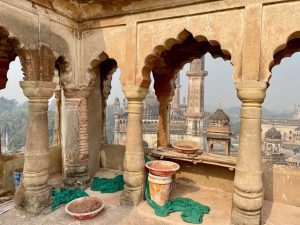
Construction and restoration project in Lucknow- photo: Rebekah Enoch
After more than 25 years of running and expanding the program, Lok Samiti can point to many programmatic and individual success stories. The original tent is gone and the brick and mortar building where Lok Samiti lives now houses a free library for where visitors check out books and a medical facility. Three times a week a Doctor comes to the on-site clinic and villagers receive free basic medical treatment with support during the interim days by trained Lok Samiti staff. The program has 20 female education centers across the area serving around 500 girls. They are taught marketable skills, healthcare and basic finance in order to strengthen their agency and foster their independence. Seventy percent of the staff at Lok Samiti are women, so these programs are run almost exclusively by women, underlining the value and strength of education for females.
Master is particularly proud of the children that came through the program who have gone on to achieve higher education and business success and he shared a couple of personal highlights with me. *Preethi, is a local young lady who had been on the path towards a forced child marriage. With intervention and support from Lok Samiti she was able to avoid the marriage, learn sewing and embroidery in their classes and open her own business giving her the financial independence to choose when she marries. *Sri Ram was a young man from Nagepur who came from a low income background and couldn’t afford the books he needed to study for the exams at the end of his schooling. These exams are the only way to get hired at many companies in India, without taking them, job prospects are severely limited. Using the free library Sri Ram was able to study and sit for the exams for a government job which is highly sought after as one of the most secure types of employment in India. Due to the level of job security these jobs provide, exams for these roles are very competitive and extremely difficult. Without access to the right texts for studying, passing would be all but impossible. Thanks to his free access to the types of books he needed for studying, coupled with his hard work, Sri Ram passed the exam and was hired by India Railways Master shares with a grin.
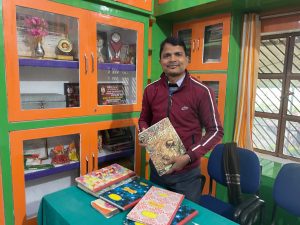
Librarian Panchmukhi Singh in the Lok Samiti Library- photo: Rebekah Enoch
Lok Samiti is a small organization that works only in the region of Nagepur. In a population of 1.408 billion people with 228.9 million categorized as poor, and therefore extremely vulnerable to modern slavery, there is still a long way to go. However, in their most recent Multidimensional Poverty Index (MPI) report released in 2022, the United Nations Development Programme (UNDP) and the Oxford Poverty and Human Development Initiative (OPHI) at the University of Oxford pointed to around 415 million people in India as having left poverty between 2005- 2021. In regions that had been among the poorest in India, poverty was reduced faster in absolute terms than the national average, and Uttar Pradesh, the state where Nagepur is located, was one of them.
Recently Sri Ram, the new India Rail employee, returned to Nagepur and Lok Samiti to visit family and friends and talk to his mentors. While there, he donated funds to the library to help ensure future students had access to these tools for success, just as he had. Thanks to the programs of Lok Samiti he had not become one of the child labor statistics, hadn’t worked under the oppression of bonded labor, instead he had received an education and access to tools that helped him break the cycle of poverty for himself and his family. While clearly there is still work to be done to address modern slavery and human trafficking in India, for Sri Ram, Preethi and others who have participated in programs at Lok Samiti or one of the many other like minded community-based grassroots programs dotted all over India, there is a story of hope and a clear message. “If I have the belief that I can do it, I shall surely acquire the capacity to do it even if I may not have it at the beginning.” – Mahatma Gandhi
*Names changed to protect identity.
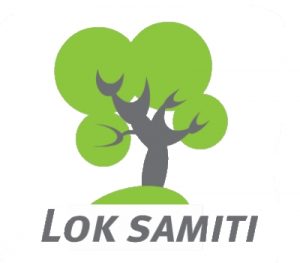
You can follow Lok Samiti on Facebook, email at loksamiti@gmail.com or follow Lok Samiti Founder Nandlal Master on Facebook for updates on the latest work and photos.
By Rebekah Enoch, Program Director at Human Trafficking Search
